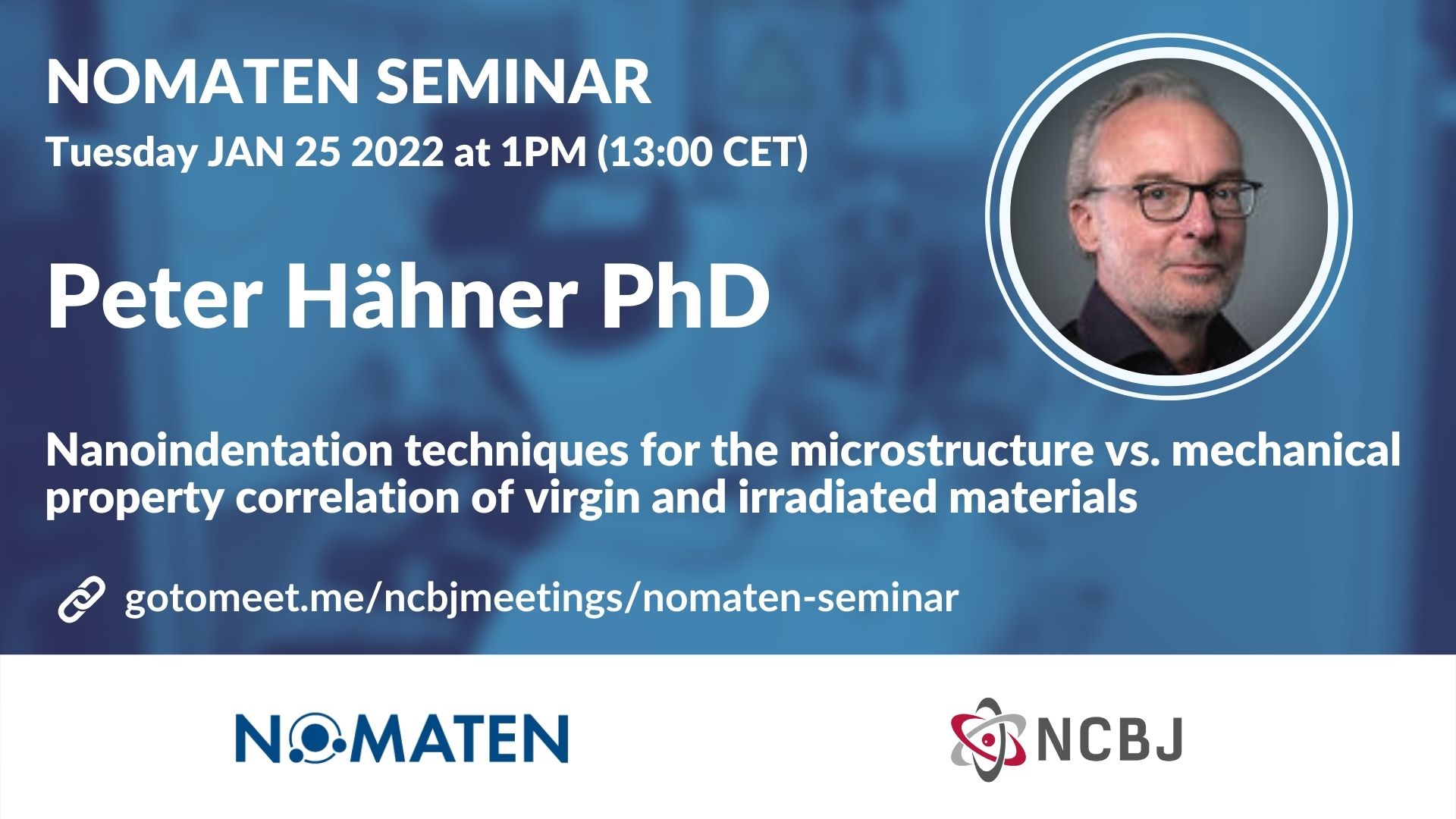NOMATEN Seminar on JAN 25: Nanoindentation techniques for the microstructure vs. mechanical property correlation of virgin and irradiated materials
NOMATEN SEMINAR
Tuesday, JANUARY 25th 2022 13:00 (1.00PM CET)
www.gotomeet.me/NCBJmeetings/nomaten-seminar
Nanoindentation techniques for the microstructure vs. mechanical property correlation of virgin and irradiated materials
Peter Hähner PhD, Joint Research Centre of the European Commission; Nuclear Safety and Security Directorate, Petten, The Netherlands
Abstract:
Charged particle irradiation can serve as a tool for the emulation of neutron irradiation damage, as damage levels can be attained at a fraction of the irradiation duration and cost. It is a method of choice for the rapid screening of the irradiation tolerance of materials as a precursor of more expensive neutron irradiation studies for nuclear reactor safety. Ion irradiation, however, has only micrometric penetration depths, requiring micro- or nanomechanical methods for the assessment of irradiation induced damage and material hardening, as compared to the macroscopic effects induced by neutron irradiation.
Instrumented indentation techniques are useful to probe the nanomechanical properties and to fingerprint microstructural features of materials. Nanoindentation is sensitive to radiation-induced microstructural changes, irradiation damage and concomitant hardening, thereby facilitating the use of ion irradiation studies to emulate neutron irradiation.
However, there are various ion vs. neutron transferability issues relating to differences in the damage processes, to the practical implementation of ion irradiation experiments, as well as to the nanoindentation method itself. The presentation focuses on benefits and limitations of different nanoindentation techniques enabling the assessment of ion-irradiation damage, such as the separation of the indentation size effect from the effect of ion irradiation under test, and the link between the nanoindentation response and the mechanical properties of interest.
The presentation capitalises on research completed by the “Multiscale Modelling for Fusion and Fission Materials” (M4F) project consortium in the dedicated "Nanoindentation" work package to which NCBJ contributed. The results to be presented help promote the use of ion irradiation for the emulation of material performance and degradation by neutron irradiation damage. This can accelerate the development of radiation tolerant materials for safe nuclear fission and fusion applications.

Bio:
Peter Hähner is a physicist holding a PhD from the University of Stuttgart, and university lecturing qualifications in Materials Science (University of Lille) and Theoretical Physics (Technical University of Braunschweig). His interests include the microstructural modelling of radiation damage and plastic deformation, (thermo-)mechanical and corrosion testing incl. advanced monitoring, test standardisation for metallic and ceramic materials, as well as small specimen and micromechanical testing techniques. He has joined the Joint Research Centre of the European Commission in Petten, The Netherlands in 2000, where he has been serving in various functions, including Head of Unit for Nuclear Reactor Safety. He is currently a Senior Expert, project leader and project portfolio leader working on materials performance, component integrity, and knowledge management of nuclear structural materials for innovative reactor systems. He has published more than 125 scientific articles (H-index 31).






